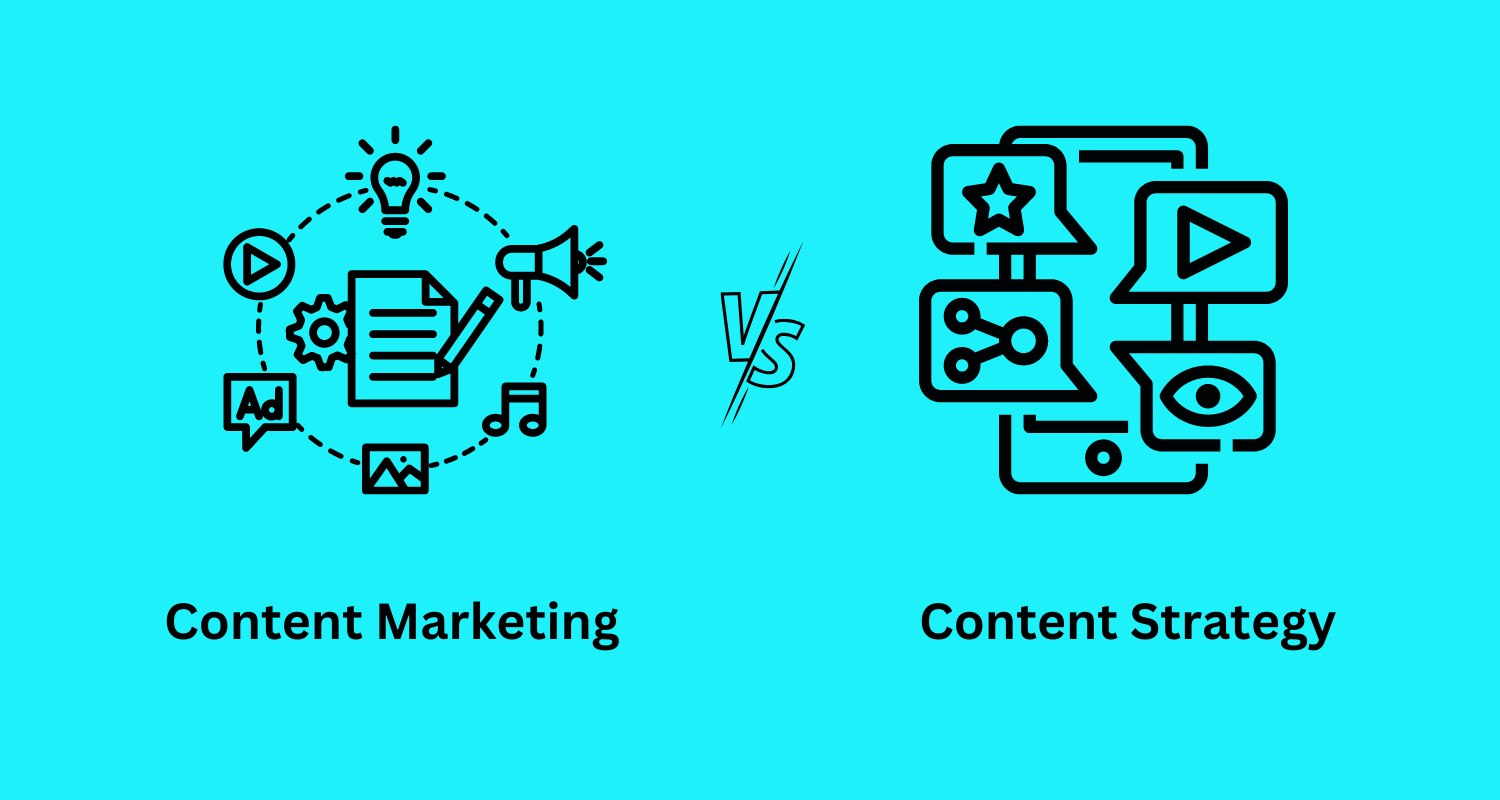In the ever-evolving landscape of digital marketing, content marketing and content strategy have emerged as crucial elements for businesses seeking to establish their online presence. While the two terms are often used interchangeably, they represent distinct approaches with unique benefits and drawbacks. In this article, we will delve into the differences between content marketing and content strategy, explore their respective advantages and disadvantages as career paths, and provide insights into popular freelancing platforms for content marketing services. What is the difference between Content Marketing vs Content Strategy?
Difference Between Paraphrasing and Plagiarism: Detailed Analysis
Understanding Content Marketing vs. Content Strategy:
Content Marketing:
Content marketing revolves around creating and distributing valuable and relevant content to attract and engage a target audience. The primary goal is to build brand awareness, drive traffic, and ultimately convert leads into customers. Content marketing involves various formats, such as blog posts, social media updates, videos, infographics, and more. Its key focus is on delivering compelling, informative, and shareable content that resonates with the target audience.

How to Start a Career in Content Marketing:
- Develop Writing Skills: Content marketing heavily relies on compelling and engaging writing. Hone your writing skills by practicing regularly, studying different writing styles, and seeking feedback to improve your craft.
- Learn Digital Marketing Fundamentals: Gain a solid understanding of digital marketing principles, including SEO (Search Engine Optimization), social media marketing, email marketing, and analytics. This knowledge will help you create content that aligns with marketing strategies and drives results.
- Build a Portfolio: Start creating your own content portfolio by writing blog posts, social media updates, or articles on platforms like Medium. Showcase your expertise, creativity, and ability to engage readers through your portfolio.
- Specialize in Niche Topics: Developing expertise in specific niches can set you apart from the competition. Choose industries or subjects that interest you and delve deep into understanding their audience, pain points, and trends. Become a go-to resource for content in those areas.
- Network and Collaborate: Attend industry events, join relevant online communities, and connect with professionals in the field. Building relationships can lead to mentorship opportunities, collaborations, and job referrals in the content marketing industry.
Content Strategy:
The content strategy encompasses content planning, development, and management to meet specific business goals. It involves defining the target audience, identifying their needs and preferences, and strategically mapping out content creation, delivery, and governance. The content strategy aligns content with the overall business objectives and ensures consistency, relevance, and effectiveness across different channels and platforms.
How to Start a Career in Content Strategy:
- Learn Content Strategy Principles: Familiarize yourself with the foundational concepts of content strategy, such as defining goals and objectives, conducting audience research, creating content frameworks, and mapping user journeys. Books, online courses, and industry blogs can provide valuable insights.
- Gain Marketing and Business Knowledge: Content strategy requires a solid understanding of marketing principles and business goals. Familiarize yourself with marketing strategies, user experience (UX) design, and the overall business landscape to effectively align content with broader objectives.
- Develop Analytical and Research Skills: Content strategists need to analyze data, conduct market research, and understand audience behavior. Enhance your data analysis, user research, and content auditing skills to inform your strategic decisions.
- Collaborate with Cross-functional Teams: Content strategy involves collaborating with various teams, including marketing, design, development, and UX. Learn to work effectively in multidisciplinary environments, communicate ideas clearly, and foster collaboration to achieve strategic content goals.
- Gain Practical Experience: Seek internships, apprenticeships, or entry-level positions with strong content strategies at companies. Practical experience will provide insights into real-world content challenges, help you refine your skills, and build a professional track record.
Benefits and Drawbacks as Career Paths:
Content Marketing:
- Benefits:
- Creativity and Flexibility: Content marketers have the opportunity to unleash their creativity in crafting engaging content and exploring various mediums.
- Measurable Results: Content marketing efforts can be measured using analytics tools, providing tangible insights into audience engagement, conversion rates, and ROI.
- Personal Branding: Content marketing allows professionals to showcase their expertise, build a personal brand, and enhance career prospects.
Drawbacks:
- Competitive Landscape: With the popularity of content marketing, the field has become highly competitive, requiring continuous innovation and differentiation.
- Content Overload: The abundance of online content poses challenges in capturing and retaining audience attention amidst information overload.
- Evolving Trends: Content marketers must stay updated with the latest trends, algorithms, and platforms to maintain effectiveness in their strategies.
Content Strategy:
- Benefits:
- Strategic Approach: Content strategists play a pivotal role in aligning content with business objectives, ensuring consistency, and driving long-term success.
- Cross-Functional Collaboration: Content strategists work closely with various teams, including marketing, design, and development, fostering collaboration and knowledge sharing.
- Scalability: A solid content strategy provides a foundation for scaling content initiatives, optimizing resources, and achieving sustainable growth.
Drawbacks:
- Complexity: Developing a comprehensive content strategy involves extensive research, analysis, and planning, which can be time-consuming and intricate.
- Organizational Buy-In: Content strategists may face challenges in gaining stakeholders' buy-in and ensuring their strategies' implementation.
- Rapid Industry Changes: The content strategy requires adaptability to evolving technology, audience behavior, and market trends, demanding continuous learning and adjustment.
Popular Freelancing Platforms for Content Marketing Services:
- Upwork: Upwork is one of the largest freelancing platforms, connecting businesses with skilled content marketers worldwide.
- Fiverr: Fiverr offers a diverse marketplace for content marketing services, allowing freelancers to showcase their expertise and attract clients.
- Freelancer: Freelancer provides a platform for content marketers to bid on projects and collaborate with clients from various industries.

- Guru: Guru offers a platform for freelancers to showcase their portfolios, connect with clients, and secure content marketing projects.
FAQs:
1: What skills do I need to pursue a content marketing or content strategy career?
A: To excel in content marketing or content strategy, it's essential to have strong writing and communication skills, a deep understanding of target audiences, familiarity with digital marketing tools and platforms, and the ability to analyze data and measure results. Creative thinking, adaptability, and a strategic mindset are also valuable attributes.
2: Can content marketing and content strategy be used together?
A: Absolutely! In fact, content marketing and content strategy are closely intertwined. A solid content strategy lays the foundation for effective content marketing by guiding the creation, distribution, and management of content aligned with business goals. Content strategy informs content marketing campaigns' messaging, channels, and tactics.
3: How long does it take to see results in content marketing?
A: Content marketing is a long-term strategy that requires patience and consistency. Results may vary depending on factors such as industry, competition, and the quality of content. While some businesses may experience immediate benefits, it typically takes several months to see significant results in terms of increased traffic, engagement, and conversions.
4: Is it necessary to specialize in a specific industry for content marketing or content strategy?
A: While specializing in a specific industry can provide advantages in terms of expertise and understanding target audiences, it is not always necessary. Many content marketers and strategists work across multiple industries, adapting their skills and knowledge to various sectors. The ability to conduct research, collaborate with subject matter experts, and learn quickly can help professionals succeed in diverse industries.
5: Are there any certifications or courses that can enhance a content marketing or content strategy career?
A: Yes, there are several certifications and courses available to enhance your skills in content marketing and content strategy. For example, HubSpot's Content Marketing Certification and Content Strategy Certification, Google Analytics Certification, and courses on platforms like Udemy and Coursera offer valuable insights and credentials to showcase your expertise in these fields.
